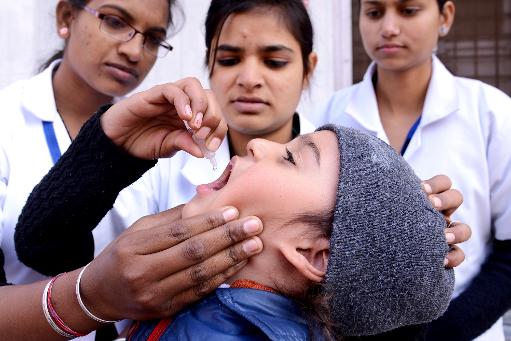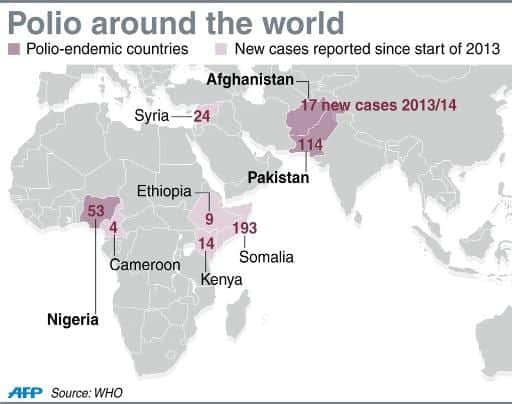80% of the world’s population is now in polio-free certified regions
New Delhi, 27 March: WHO South-East Asia Region, home to a quarter of the world’s population, was certified polio-free today by an independent commission under the WHO certification process. This is the fourth of six WHO Regions to be certified, marking an important step towards global polio eradication. With this step, 80% of the world’s population now lives in certified polio-free regions.
An independent panel of 11 experts in public health, epidemiology, virology, clinical medicine and related specialties constituting the South-East Asia Regional Certification Commission for Polio Eradication (SEA-RCCPE) met for two days to review evidence from countries before reaching the decision that all 11 countries of the Region are now polio-free and have met the requirements for certification.
Before a Region can be certified polio-free, several conditions must be satisfied such as: at least three years of zero confirmed cases due to indigenous wild poliovirus; excellent laboratory-based surveillance for poliovirus; demonstrated capacity to detect, report, and respond to imported cases of poliomyelitis; and assurance of safe containment of polioviruses in laboratories (introduced since 2000).

An Indian child receives polio vaccination drops from a medical volunteer during an immunization program in Amritsar on January 19, 2014 (AFP/File, Narinder Nanu)
“This is a momentous victory for the millions of health workers who have worked with governments, nongovernmental organizations, civil society and international partners to eradicate polio from the Region. It is a sign of what we can bequeath our children when we work together,” said Dr Poonam Khetrapal Singh, Regional Director for the WHO South-East Asia Region.
Polio eradication programmes, through their networks and knowledge in reaching the ‘unreached’, have strengthened the delivery of health services to the most vulnerable communities. “Thanks to polio eradication, we now know where these children are who were difficult to reach with vaccine. Now the polio programme has successfully reached them with polio drops in every round, there is no excuse not to go back with other critical health services, from how to have a safe birth, to where to get access to tuberculosis treatment and how to prevent HIV infection,” said Dr Khetrapal Singh.
Through the effort to eradicate polio, health personnel and community workers have been trained and provided with critical equipment to improve vaccination and health services for other childhood diseases. Comprehensive global laboratory and communication networks have been built and are being used for other diseases. Most recently, these networks played a critical role in responding to avian influenza.

Graphic on worldwide polio cases (AFP/File)
Certification of the Region comes as countries prepare for the introduction of inactivated polio vaccine (IPV) in routine immunization as part of the eventual phasing out of oral polio vaccines (OPV). More than 120 countries currently use only OPV. These countries will introduce a dose of IPV by the end of 2015 as part of their commitment to the global polio endgame plan which aims to ensure a polio-free world by 2018.
While celebrating the historic achievement, the WHO Regional Director also sounded a word of caution to maintain high vigilance against importation of polio. “Until polio is globally eradicated, all countries are at risk and the Region’s polio-free status remains fragile. High immunization coverage can prevent an imported virus from finding an underimmunized, susceptible population. A sensitive surveillance system, able to quickly detect and identify any importation and guide a programmatic response, is critical,” she added.
WHO’s South-East Asia Region comprises the following 11 Member States: Bangladesh, Bhutan, Democratic People’s Republic of Korea, India, Indonesia, Maldives, Myanmar, Nepal, Sri Lanka, Thailand and Timor-Leste.
Ms Vismita Gupta-Smith, Public Information and Advocacy Officer, WHO Regional Office for South-East Asia. Email: guptasmithv@who.int, Mobile: +91 9871329861, Tel: +91 11 23370804, Extn: 26401.
Ms Sona Bari, External Relations – Global Polio Eradication Initiative, WHO-HQ, Geneva. E-mail: baris@who.int ; Mobile +41 79 475 5511.
For more information, please visit our website:http://www.searo.who.int/entity/tb/en/
Follow us on our Social Media sites: Facebook (www.facebook.com/#!/WHO), Twitter (@WHO)and You Tube (http://www.youtube.com/whosoutheastasia)
